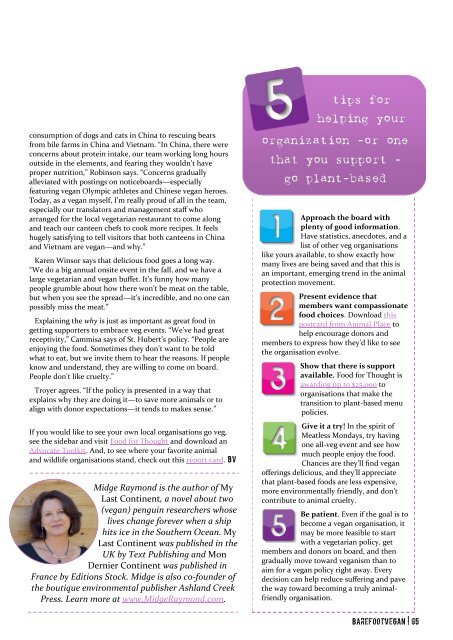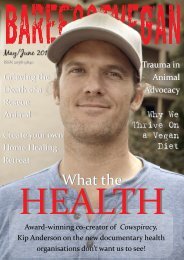Barefoot Vegan Magazine March_April 2017 issue
This issue of Barefoot Vegan Magazine is themed around community. We speak to vegan social justice activist, Brenda Sanders about what motivates her work, her best advice on running effective community outreach programmes and how to avoid burnout. We also feature interviews with London Afro Vegan's Esme, co-founder of Food Not Bombs, Keith McHenry, and we talk about community crowdfunding with One Planet Pizza's Mike Hill. Plus as usual, we've got lots of beautiful and inspiring content from our contributors and a huge selection of delicious vegan recipes.
This issue of Barefoot Vegan Magazine is themed around community. We speak to vegan social justice activist, Brenda Sanders about what motivates her work, her best advice on running effective community outreach programmes and how to avoid burnout.
We also feature interviews with London Afro Vegan's Esme, co-founder of Food Not Bombs, Keith McHenry, and we talk about community crowdfunding with One Planet Pizza's Mike Hill.
Plus as usual, we've got lots of beautiful and inspiring content from our contributors and a huge selection of delicious vegan recipes.
You also want an ePaper? Increase the reach of your titles
YUMPU automatically turns print PDFs into web optimized ePapers that Google loves.
consumption of dogs and cats in China to rescuing bears<br />
from bile farms in China and Vietnam. “In China, there were<br />
concerns about protein intake, our team working long hours<br />
outside in the elements, and fearing they wouldn’t have<br />
proper nutrition,” Robinson says. “Concerns gradually<br />
alleviated with postings on noticeboards—especially<br />
featuring vegan Olympic athletes and Chinese vegan heroes.<br />
Today, as a vegan myself, I’m really proud of all in the team,<br />
especially our translators and management staff who<br />
arranged for the local vegetarian restaurant to come along<br />
and teach our canteen chefs to cook more recipes. It feels<br />
hugely satisfying to tell visitors that both canteens in China<br />
and Vietnam are vegan—and why.”<br />
Karen Winsor says that delicious food goes a long way.<br />
“We do a big annual onsite event in the fall, and we have a<br />
large vegetarian and vegan buffet. It’s funny how many<br />
people grumble about how there won’t be meat on the table,<br />
but when you see the spread—it’s incredible, and no one can<br />
possibly miss the meat.”<br />
Explaining the why is just as important as great food in<br />
getting supporters to embrace veg events. “We’ve had great<br />
receptivity,” Cammisa says of St. Hubert’s policy. “People are<br />
enjoying the food. Sometimes they don’t want to be told<br />
what to eat, but we invite them to hear the reasons. If people<br />
know and understand, they are willing to come on board.<br />
People don’t like cruelty.”<br />
Troyer agrees. “If the policy is presented in a way that<br />
explains why they are doing it—to save more animals or to<br />
align with donor expectations—it tends to makes sense.”<br />
If you would like to see your own local organisations go veg,<br />
see the sidebar and visit Food for Thought and download an<br />
Advocate Toolkit. And, to see where your favorite animal<br />
and wildlife organisations stand, check out this report card. BV<br />
Midge Raymond is the author of My<br />
Last Continent, a novel about two<br />
(vegan) penguin researchers whose<br />
lives change forever when a ship<br />
hits ice in the Southern Ocean. My<br />
Last Continent was published in the<br />
UK by Text Publishing and Mon<br />
Dernier Continent was published in<br />
France by Editions Stock. Midge is also co-founder of<br />
the boutique environmental publisher Ashland Creek<br />
Press. Learn more at www.MidgeRaymond.com.<br />
Approach the board with<br />
plenty of good information.<br />
Have statistics, anecdotes, and a<br />
list of other veg organisations<br />
like yours available, to show exactly how<br />
many lives are being saved and that this is<br />
an important, emerging trend in the animal<br />
protection movement.<br />
Present evidence that<br />
members want compassionate<br />
food choices. Download this<br />
postcard from Animal Place to<br />
help encourage donors and<br />
members to express how they’d like to see<br />
the organisation evolve.<br />
Show that there is support<br />
available. Food for Thought is<br />
awarding up to $25,000 to<br />
organisations that make the<br />
transition to plant-based menu<br />
policies.<br />
Give it a try! In the spirit of<br />
Meatless Mondays, try having<br />
one all-veg event and see how<br />
much people enjoy the food.<br />
Chances are they’ll find vegan<br />
offerings delicious, and they’ll appreciate<br />
that plant-based foods are less expensive,<br />
more environmentally friendly, and don’t<br />
contribute to animal cruelty.<br />
Be patient. Even if the goal is to<br />
become a vegan organisation, it<br />
may be more feasible to start<br />
with a vegetarian policy, get<br />
members and donors on board, and then<br />
gradually move toward veganism than to<br />
aim for a vegan policy right away. Every<br />
decision can help reduce suffering and pave<br />
the way toward becoming a truly animalfriendly<br />
organisation.<br />
<strong>Barefoot</strong><strong>Vegan</strong> | 65




